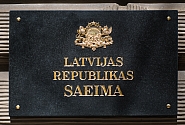
Latvia will withdraw from the Convention on the Prohibition of the Use, Stockpiling, and Production of Anti-Personnel Mines and on their Destruction (Ottawa Convention), provides a law adopted by the Saeima in the final reading as a matter of urgency on Wednesday, 16 April.
“Withdrawal from the Ottawa Convention will give our armed forces room for manoeuvre in the event of a military threat to use all means possible to defend our citizens,” emphasised Ināra Mūrniece, Chair of the Saeima Foreign Affairs Committee, which was responsible for advancing the draft law. Estonia, Lithuania, Poland, and Finland have also announced their withdrawal from the Ottawa Convention, explained Mūrniece, stressing that non-command detonated anti-personnel mines will serve as an additional tool, helping protect the lives of our soldiers on the border more effectively and allowing them to fight the enemy and defend the Latvian state.
As explained in the law, in the 20 years since Latvia joined the Convention, the regional security landscape has changed significantly. By launching a full-scale aggression against Ukraine on 24 February 2022, Russia has demonstrated its blatant disrespect for the territorial borders of sovereign states and for international law, including the principles enshrined in the United Nations Charter. Considering the development of the regional security situation, it is essential for Latvia not to limit flexibility in its actions and to use a variety of weapons systems and solutions to strengthen deterrence and ensure the protection of the country and its people.
According to the National Armed Forces of Latvia, withdrawal from the Convention would enable the use of additional means to deter potential adversaries and impede their movement more effectively.
Latvia acceded to the Convention in 2005 and has since then complied with its commitments; it has not produced, stockpiled, transferred, or used non-command detonated anti-personnel mines. In addition, according to the new law, Latvia had already completed the destruction of all its stockpiles of non-command detonated anti-personnel mines in 2010.
Latvia is bound by a number of international treaties on international humanitarian law and human rights. Therefore, the potential use of anti-personnel mines in the future should only be allowed in accordance with binding international law, including customary international humanitarian law and human rights law, underlines the explanatory note to the draft law.
The Ministry of Foreign Affairs will send the withdrawal document to the states parties to the Convention, the Secretary-General of the United Nations, and the Security Council. The withdrawal document will state the reason for withdrawal, which is listed in the annex to the law.
Withdrawal from the Ottawa Convention will take effect six months after the United Nations has received the documents.
Saeima Press Service







